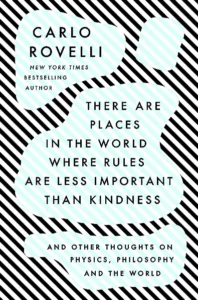There are Places in the World Where Rules are Less Important Than Kindness: And Other Thoughts on Physics, Philosophy, and the World by Carlo Rovelli 2022
This is the fourth book of Rovelli’s that I’ve read. The first one dealt with seven basic concepts in physics (‘Seven Basic Lessons on Physics’); the second one with time (‘The Order of Time’); the third one delved into quantum mechanics (‘Helgoland’). I found them beautifully written and intellectually challenging and fascinating.
So it was with great anticipation that I opened Rovelli’s latest book. I should have been warned by the meandering, confusing, and unsatisfying title, but I plunged ahead, and as the title indicated, this book lacked focus and often failed to engage my interest. The chapters on physics and the notable individuals from the past were superb. The chapters on philosophy were less so, and the chapters on anthropology and his musings on the human condition were not satisfying at all.
But overall, this was a book worth reading. Rovelli has an insatiable curiosity and a fine ability to translate his findings into clear and well organized prose. His essays on contemporary giants like Einstein, Marie Curie, Stephen Hawking, and the Oxonian Nobel mathametician Roger Penrose were informative and contained information I had not been aware of. His essays on unknown to me figures from the past like Ramon Llull, an obscure Majorcan whose 1294 ‘Ars Magna’ is evidently the basis for graphing and all combinatorial math, the Berkeley Nobelist Kip Thorne who found gravitational waves, Giacomo Leopardi whose 1813 ‘History of Astronomy’ was written when he was 15, and Georges Lemaitre who anticipated the Big Bang and the expanding universe years before Hubble were wonderou and wonderful.
But my very favorite essay was the one in which he described one of my literary heroes, Vladimir Nabokov who lived a few blocks from our home in Cambridge and worked as the curator of the lepidoptera section of the Harvard Museum of Comparative Zoology in the 1950’s. Nabokov in addition to writing some of the greatest works of the 20th C (he should have received the Nobel Prize!!!), was a life long butterfly collector and not only discovered a new species Naboko-via cuzquenha but proposed an hypothesis for the migration of the Blue Icarus that was recently proven to be true based on modern DNA sequencing. Rovelli quotes Nabokov from his masterful memoir ‘Speak Memory’ as follows: “I discovered in nature the non-utilitarian delights that I sought in art. Both were a form of magic, both were a game of intricate enchantment and deception.” Reading this book for just those two sentences would have made it worthwhile.



